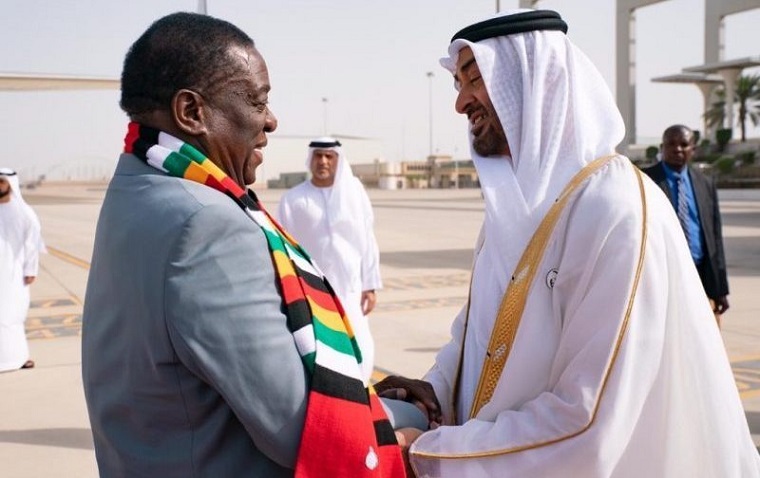 The United Arab Emirates is likely to double or triple its investment in Zimbabwe because it has noticed a tangible difference in the kind of synergetic relations it has built with President Emerson Mnangagwa and everyone in his Administration to date, writes Mfonobong Nsehe in Forbes.
The United Arab Emirates is likely to double or triple its investment in Zimbabwe because it has noticed a tangible difference in the kind of synergetic relations it has built with President Emerson Mnangagwa and everyone in his Administration to date, writes Mfonobong Nsehe in Forbes.
“There’s a new energy in Harare, and a real commitment to more deeply integrate Zimbabwe with key players in the global economy. This comes from the new Government’s visible desire to accelerate the pace of economic improvement in Zimbabwe, and to us, that’s a very good sign.
“The signing of Double Taxation and Bilateral Investment Protection Agreements has also been instrumental in lifting the bilateral relationship with the UAE.”
And it is not looking back despite the economic crisis that the country is going through.
Zachary Smith an Emerging Markets analyst in New York said: “Expect more cross-sector investment. I don’t want to sound overly optimistic as there are still real challenges in the country, but there is good reason to believe that we will see a doubling, if not tripling of the kind of investment launched by UAE in the very near future. The world should receive the message loud and clear that Zimbabwe is open for business again.”
Below is the full interview:
Zimbabwe is going through an unbelievable socio-economic crisis and is slowly reaching a tipping level. With skyrocketing inflation, a biting Forex crunch and failing institutions among the myriad issues the leadership of President Emmerson Mnangagwa is grappling with, many investors are scrambling for safety. And yet, the United Arab Emirates is making bold overtures to invest in the country’s economy and is exploring new areas of partnership with the Southern African country.
Last December, Sheikh Khalifa bin Zayed Al Nahyan, the President of the UAE, issued a decree to establish an Embassy for the UAE in Zimbabwe. The UAE-government has also donated millions of dollars worth of medical equipment to the country and delegations of prominent businessmen from the Arab emirate have been visiting Zimbabwe recently to explore opportunities there.
Zachary Campbell Smith, a Washington D.C.-based, Emerging Market geopolitical analyst has long documented African investment opportunities and in association with Senior Fellows at the Arcadia Foundation, Zimbabwe opportunities and challenges. I recently caught up with him in New York where we discussed the co-operation between the United Arab Emirates (UAE) and Zimbabwe’s new, struggling government.
MN: For decades, while under the rule of former President Mugabe, the Republic of Zimbabwe suffered tremendous socioeconomic challenge. Freedoms were stifled, heavy taxation on foreign integration coupled with indigenization policies drove away foreign investment; over the course of years, each election to potentially bring about change to this set of circumstances drew controversial results, keeping his ZANU-PF Party in control. However, you’ve since been following the administration of President Mnagagwa and in particular, his promotion to the world that under his leadership, Zimbabwe is once again open for business. The President is a long-time member of the ZANU-PF. In your opinion, can we expect more of the same or is there real potential for the President’s developmental agenda to bear fruit?
ZS: There’s no question that the international community needs to take a fresh look at the Republic of Zimbabwe. Unlike Robert Mugabe, President Mnagagwa has dedicated his Presidency to redefining ‘business as usual’ in the Sub Saharan African potential economic power player and has been making his rounds internationally to incentivize trade and investment with Zimbabwe. A few intrepid nations such as the UAE have taken note of this tangible difference in leadership, the openness of his Administration to accept the realities of the Republic’s geopolitical situation, his work to rehabilitate the quality of life for Zimbabwean people (putting Party politics aside) while at the same time, acknowledging the Administration’s renewed drive to leverage the nation’s vast natural resources and trade potential that have drawn attention historically.
MN: What are some of the key factors that have influenced the strengthening of bilateral ties between the UAE and Zimbabwe?
ZS: The UAE is clearly setting a milestone in global investment in Africa for others to follow. The strengthening of bilateral ties can, in part, be credited to the economic liberalization policies and policy implementation efficacy of the new Administration of Zimbabwe President Emerson Mnagagwa. The Zimbabwe I see today has rapidly reversed from the indigenization act and longstanding overregulation and financial mismanagement, when Zimbabwe’s government overstretched its roles in key economic sectors and created conditions which stifled foreign investment and integration. This hindered their own prospects for mutually beneficial global partnerships and stifled growth.
Continued next page
(272 VIEWS)


